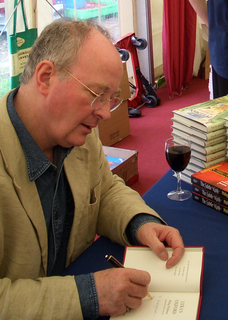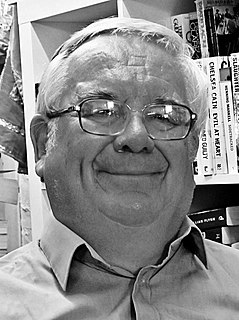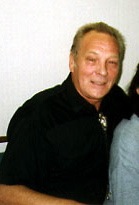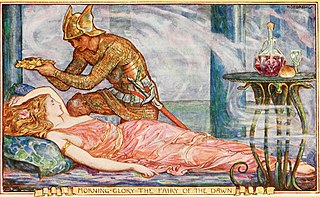
Fantasy films are films that belong to the fantasy genre with fantastic themes, usually magic, supernatural events, mythology, folklore, or exotic fantasy worlds. The genre is considered a form of speculative fiction alongside science fiction films and horror films, although the genres do overlap. Fantasy films often have an element of magic, myth, wonder, escapism, and the extraordinary. Prevalent elements include fairies, angels, mermaids, witches, monsters, wizards, unicorns, dragons, talking animals, ogres, elves, trolls, white magic, gnomes, vampires, werewolves, ghosts, demons, dwarves, giants, goblins, anthropomorphic or magical objects, familiars, curses and other enchantments, worlds involving magic, and the Middle Ages.

Horror is a genre of fiction which is intended to frighten, scare, or disgust. Horror is often divided into the sub-genres of psychological horror and supernatural horror, which is in the realm of speculative fiction. Literary historian J. A. Cuddon, in 1984, defined the horror story as "a piece of fiction in prose of variable length... which shocks, or even frightens the reader, or perhaps induces a feeling of repulsion or loathing". Horror intends to create an eerie and frightening atmosphere for the reader. Often the central menace of a work of horror fiction can be interpreted as a metaphor for larger fears of a society.

Sir Philip Nicholas Outram Pullman is an English writer. His books include the fantasy trilogy His Dark Materials and The Good Man Jesus and the Scoundrel Christ, a fictionalised biography of Jesus. In 2008, The Times named Pullman one of the "50 greatest British writers since 1945". In a 2004 BBC poll, he was named the eleventh most influential person in British culture. He was knighted in the 2019 New Year Honours for services to literature.

Ramsey Campbell is an English horror fiction writer, editor and critic who has been writing for well over fifty years. He is the author of over 30 novels and hundreds of short stories, many of them winners of literary awards. Three of his novels have been adapted into films.

Brian Lumley is an English author of horror fiction. He came to prominence in the 1970s writing in the Cthulhu Mythos created by American writer H. P. Lovecraft but featuring the new character Titus Crow, and went on to greater fame in the 1980s with the best-selling Necroscope series, initially centered on character Harry Keogh, who can communicate with the spirits of the dead.

Science fiction is a film genre that uses speculative, fictional science-based depictions of phenomena that are not fully accepted by mainstream science, such as extraterrestrial lifeforms, spacecraft, robots, cyborgs, interstellar travel or other technologies. Science fiction films have often been used to focus on political or social issues, and to explore philosophical issues like the human condition.
Genre fiction, also known as popular fiction, is a term used in the book-trade for fictional works written with the intent of fitting into a specific literary genre, in order to appeal to readers and fans already familiar with that genre.

Peter Francis Straub was an American novelist and poet. He wrote numerous horror and supernatural fiction novels, including Julia and Ghost Story, as well as The Talisman, which he co-wrote with Stephen King. Straub received such literary honors as the Bram Stoker Award, World Fantasy Award, and International Horror Guild Award.

Margaret Astrid Lindholm Ogden, better known by her pen names Robin Hobb and Megan Lindholm, is an American writer. Her work spans the speculative fiction genre, ranging from secondary-world fantasy as Hobb, to urban fantasy and science fiction as Lindholm. She is best known for her novels set in the Realm of the Elderlings – comprising the Farseer, Liveship Traders and Tawny Man trilogies, the Rain Wild chronicles, and the Fitz and the Fool trilogy – that are regarded as works of character-driven fantasy and have sold more than a million copies.
Urban fantasy is a subgenre of fantasy which places imaginary and unreal elements in an approximation of a contemporary urban setting. The combination provides the writer with quixotic plot-drivers, unusual character traits, and a platform for classic fantasy tropes, without demanding the creation of an entirely-imagined world. Although precursors of urban fantasy date back to the 19th century, the term dates back to the 1970s. The current popularity began in the 1980s, with writers encouraged by the success of Stephen King and Anne Rice.
Low fantasy, or intrusion fantasy, is a subgenre of fantasy fiction in which magical events intrude on an otherwise-normal world. The term thus contrasts with high fantasy stories, which take place in fictional worlds that have their own sets of rules and physical laws.
Dark fantasy is a subgenre of fantasy literary, artistic, and cinematic works that incorporate disturbing and frightening themes of fantasy. It often combines fantasy with elements of horror or has a gloomy dark tone or a sense of horror and dread.

Lovecraftian horror, sometimes used interchangeably with "cosmic horror", is a subgenre of horror fiction and weird fiction that emphasizes the horror of the unknowable and incomprehensible more than gore or other elements of shock. It is named after American author H. P. Lovecraft (1890–1937). His work emphasizes themes of cosmic dread, forbidden and dangerous knowledge, madness, non-human influences on humanity, religion and superstition, fate and inevitability, and the risks associated with scientific discoveries, which are now associated with Lovecraftian horror as a subgenre. The cosmic themes of Lovecraftian horror can also be found in other media, notably horror films, horror games and comics.

The Liveship Traders is a trilogy of fantasy novels by American author Robin Hobb. A nautical fantasy series, the Liveship Traders is the second trilogy set in the Realm of the Elderlings and features pirates, sea serpents, a family of traders and their living ships. Several critics regard it as Hobb's best work.

Fantasy is a genre of speculative fiction involving magical elements, typically set in a fictional universe and sometimes inspired by mythology and folklore. Its roots are in oral traditions, which then became fantasy literature and drama. From the twentieth century, it has expanded further into various media, including film, television, graphic novels, manga, animations and video games.

The following outline is provided as an overview of and topical guide to fantasy:

Victoria Elizabeth Schwab is an American writer. She is known for the 2013 novel Vicious, the Shades of Magic series, and The Invisible Life of Addie LaRue, which was nominated for the 2020 Locus Award for Best Fantasy Novel. She publishes children's and young adult fiction books published under the name Victoria Schwab. She is the creator of the supernatural teen drama series First Kill , based on her short story of the same name originally published in the 2020 anthology Vampires Never Get Old: Tales With Fresh Bite.
Vault Comics is an American publisher of comic books. The company is known for its horror, fantasy, and science fiction titles, with a focus on diversity and cross-media properties.











